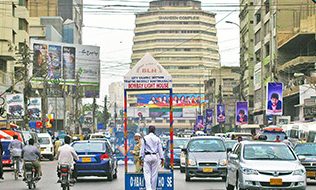
Active investors that are increasing their exposure to emerging markets should take a prudent approach on which businesses to allocate their money to, attendees at a presentation organized by Fidelity Investments heard on Thursday.
While emerging markets have performed favourably with commodity prices and exchange rates stabilizing in recent months, they’re still vulnerable to recurring risks of political and economic instability, noted Alex Duffy, portfolio manager of the global emerging markets fund at Fidelity.
Ten to 15 years ago, Latin America, along with Europe, the Middle East and Africa, represented about half of emerging markets, a number that’s now down to about 30 per cent, said Duffy. Since then, Asia has come to dominate at about 70 per cent of allocations.
Read: The investment prospects for Middle Eastern sovereign bonds
India and China both come with opportunities and risk, said Duffy. He noted that with 1.4 billion citizens, India’s huge domestic economy provides investors with real opportunities to deploy capital at attractive rates of return. But the country still carries a track record of inefficiency due to conflicting regulatory policies. Still, Duffy noted India is going through significant reforms and plans to harmonize its fragmented goods and services tax in June.
Such reforms will make it easier for investors that have businesses in different Indian states because it will reduce “huge inefficiencies and friction costs,” said Duffy.
Chinese companies, on the other hand, are still grappling with large amounts of debt, said Duffy. With debt loads raising questions about the stability of their balance sheets, Duffy stressed the importance of investors assessing the fundamentals of the businesses they invest in.
Read: Why emerging market equities deserve a fresh look
Overall, investors should focus on solid companies with good management teams, said Duffy.
He cited AVI Ltd. in South Africa and Petrobras in Brazil as two businesses that delivered diverging performances in recent years despite experiencing currency depreciation and volatile economic environments after the global financial crisis. Consumer foods company AVI, he noted, had a “deeply ingrained owner management culture in its team” with executive compensation based on the business’ long-term performance. “So they thought like owners, and that’s a critical point.”
On the other hand, many leaders at state-owned oil company Petrobras were political appointees, said Duffy. “They may have had different interests and served different masters . . . so that could have led to instances where shareholder capital was treated less prudently [and] with less respect.”
With different types of management, it’s no surprise the companies followed opposite strategies, said Duffy. While AVI delayed investing more capital to grow its business from 2009-12, Petrobras pumped significant resources into a number of projects.
Read: Emerging Asian markets expected to grow amid volatility: report
And at one point, Petrobras was spending about US$50 billion per year on capital expenditures, said Duffy. “When they undertook this, there were only three other companies in Brazil with a market capitalization greater than $50 billion.”
As a result, AVI produced a return on invested capital of 2.8 per cent from 2009-16. At Petrobras, the return on invested capital was zero per cent, said Duffy.
Given the risks, he stressed that investors should follow a disciplined approach when it comes to screening stocks. “Provided that . . . you’re prudent in how you allocate capital to ensure alignment and defend capital at the outset [and] then compound that with investment time horizon . . . I really do believe there are always opportunities within emerging markets.”
